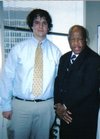Speaking To But Not For - Though Not In N. Carolina
Baptists have always claimed that one Baptist can not speak for other Baptists.
Thus, Baptists engaged in public policy have always operated by the following motto:
Hence, the motto "Speaking To But Not For"
No one Baptist speaks for another. The very distinctive that makes us Baptist is called ‘freedom of conscience,’ ‘soul freedom,’ ‘voluntarism’ or ‘the priesthood of the believer. Each of these expressions suggests that as individuals we stand free and therefore responsible before God for our own beliefs. Back in 1971, James Dunn summed up this baptistic idea:
No one group can be the conscience of Baptists. But because we care, we may stir the consciences of those who share a common calling in Jesus Christ. No one report can bring conviction concerning moral imperatives in a confused and confusing social order. Yet, God’s Holy Spirit can and does work through weak instruments to speak a prophetic word, to challenge injustice, to call for advance and to apply a biblical faith to all areas of life.Unfortunately, the Council on Christian Life and Public Affairs of the Baptist State Convention of North Carolina has decided to completely trash the historic Baptist belief that "No One Baptist Speaks For Another." Check out this story. A snippet below:
The Council on Christian Life and Public Affairs announced its intention to move from a committee that speaks "to" Baptists to a committee that engages policy makers in the public forum and speaks "for" Baptists.Sadly, the Baptist ideal of The Unfettered Conscience is no more in North Carolina.
Ron Varner, pastor of Falling Creek Baptist Church in Goldsboro, reported for the Council on Christian Life and Public Affairs and said he regretted that he is near the end of his term on the council, because "it's just starting to get good.""We're talking about a shift from just talking 'to' North Carolina Baptists, to talking 'for' North Carolina Baptists in the public forum," he said.
The state best known for its rich Genealogy of Dissent has indeed changed dramatically in recent decades.
Apparently the Council plans in the upcoming weeks to take various conservative political positions FOR North Carolina Baptists. The Council even plans to hold a public forum on "what Charles Spurgeon could teach 21st century Baptists on politics." I got $50 that says the forum will forget to mention that Charles Haddon Spurgeon was one of the most vocal and influential British Baptist peacemakers of the nineteenth century...
typed by Alexis
Labels: soul freedom




















